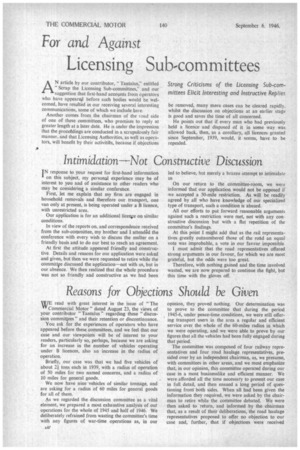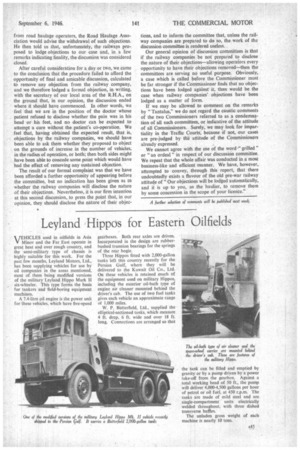Reasons for Objections Should be Given
Page 46

Page 47

If you've noticed an error in this article please click here to report it so we can fix it.
WE read with great interest in the issue of " The " Commercial Motor" dated August 23, the views of your contributor " Tantalus " regarding these "discussion committees" and their retention or discontinuance.
You ask for the experiences of operators who have appeared before these committees, and -we feel that our case and our viewpoints will be of interest to your readers, particularly so, perhaps, because we are asking for an increase in the number of vehicles operating under B licences, also an increase in the radius of operation.
Briefly, our case was that we had five vehicles of about 21 tons each in 1939, with a radius of operation of 50 miles for two named concerns, and a radius of 10 miles for general goods.
We now have nine vehicles of similar tonnage, and are asking for a radius of 60 miles for general goods for all of them.
. As we regarded the discussion committee as a vital element, we prepared a most exhaustive analysis of out operations for the whole of 1945 and half of 1946. We deliberately refrained from wasting the committee's time with any figures of war-time operations as, in our
opinion, they proved nothing. Our determination was to prove to the committee that during the period 1945-6, under peace-time conditions, we were still offering transport users in the area a regular and efficient service over the whole of the 60-miles radius in which we were operating, and we were able to prove by our figures that all the vehicles had been fully engaged during that period.
The committee was composed of four railway representatives and four road haulage representatives, presided over by an independent chairman, as, we presume, with committees in other areas, and we must emphasize that, in our opinion, this committee operated during our case in a most businesslike and efficient manner. We were afforded all the time necessary to present our case in full detail, and then ensued a long period of questioning front both sides. When all had been given the information they required, we were asked by the chairman to retire while the committee debated. We were then asked to return, and informed by the chairman that, as a result of their deliberations, the road haulage representatives proposed to offer no objection to our case and, further, that if objections were received from road haulage operators, the Road Haulage Association would advise the withdrawal of such objections. He then told us that, unfortunately, the railways proposed to lodge objections to our case and, in a few remarks indicating finality, the discussion was considered closed.
After careful consideration for a day or two, we came to the conclusion that the procedure failed to afford the opportunity of final and amicable discussion, calculated to remove any objection from the railway company. and we therefore lodged a formal objection, in writing, with the secretary of our local area of the R.H.A., on the ground that, in our opinion, the discussion ended where it should have commenced. In other words, we feel that we are in the position of the doctor whose patient refused to disclose whether the pain was in his head or his feet, and no doctor can be expected to attempt a cure without the patient's co-operation. We feel that, having obtained the expected result, that is, objections by the railway companies, we should have been able to ask them whether they proposed to object on the grounds of increase in the number. of vehicles, in the radius of operation, or both; then both sides might have been able to concede some point which would have had the effect of removing any sustained objection.
The result of our formal complaint was that we have been afforded a further opportunity of appearing before the committee, but no indication has been given as to whether the railway companies will disclose the nature of their objections. Nevertheless, it is our firm intention at this second discussion, to press the point that, in our opinion, they should disclose the nature of their objec tions, and to inform the committee that, unless the railway companies are prepared to do so, the work of the discussion committee is rendered useless.
Our general opinion of discussion committees is that if the railway companies be not prepared to disclose the nature of their objections—allowing operators every opportunity to have their objections removed—then the committees are serving no useful purpose. Obviously, a case which is called before the Commissioner must be far stronger if the Commissioner finds that no objections have been lodged against it, than would be the case when railway companies' objections have been lodged as a matter of form.
If we may be allowed to comment on the remarks by "Tantalus," we do not regard the caustic comments of the two Commissioners referred to as a condemnation of all such committees, or indicative of the attitude of all Commissioners. Surely, we may look for impartiality in the Traffic Courts, because if not, our cases are pre-judged by the attitude of the Commissioners already expressed.
We cannot agree with the use of the word." grilled" or "an ordeal" in respect of our discussion committee. We repeat that the whole affair was conducted in a most business-like and efficient manner, We have, however, attempted to convey, through this report, that there undoubtedly exists a flavour of the old pre-war railway attitude of " Our objections will be lodged automatically, and it is up to you, as the haulier, to remove them by some concession in the scope of your licence."




































































